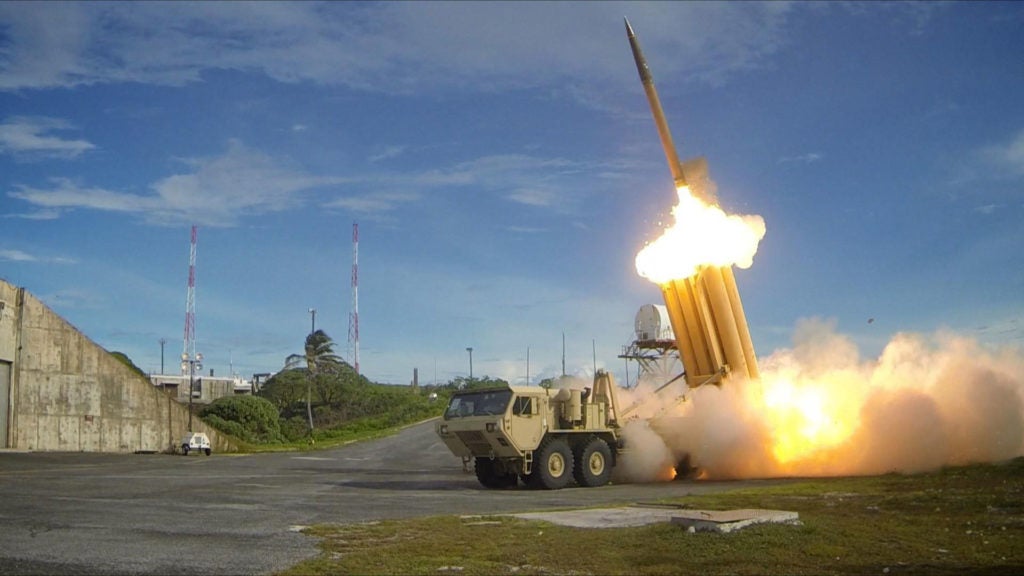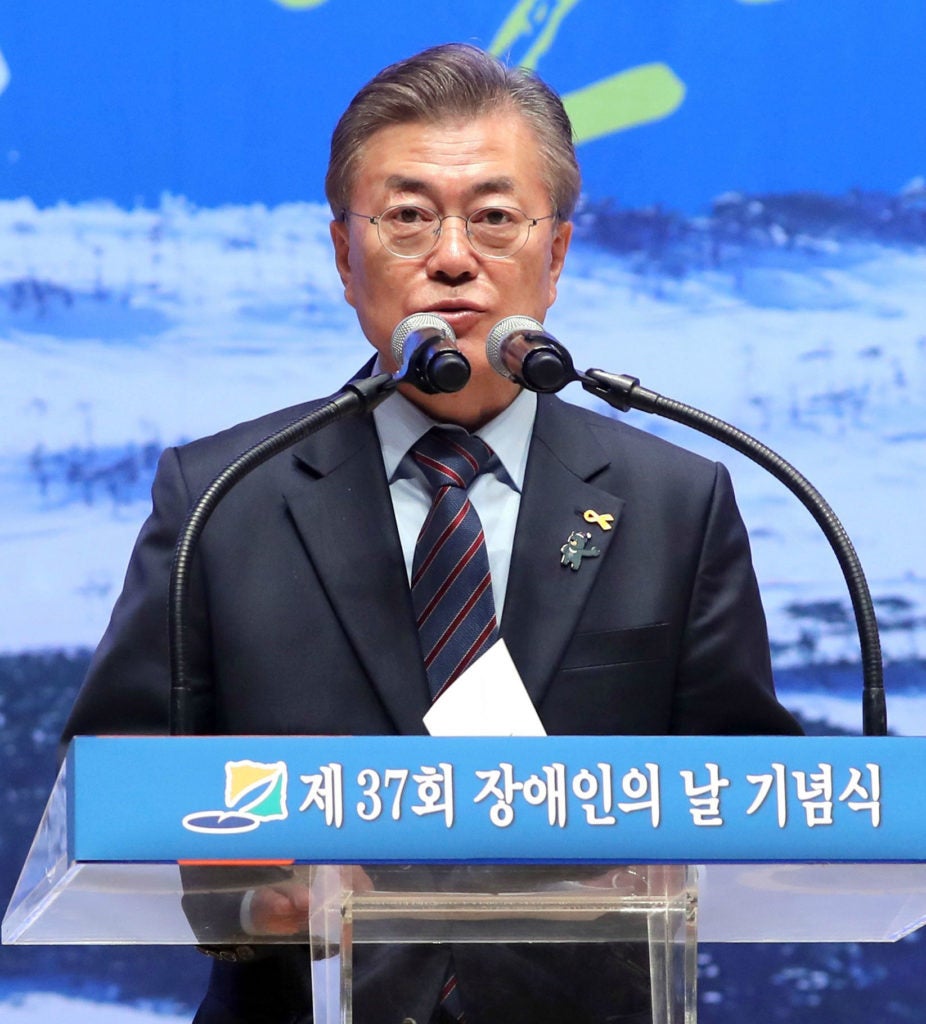President Donald Trump made several worrying remarks during an interview with Reuters last week that raise questions about his Asia policy and his ability to implement it.
Trump’s comments come at a particularly inopportune time as his administration unveils its North Korea policy and seeks international support to ratchet up pressure on Pyongyang—all while South Korea holds a presidential election.
The administration quickly walked back the president’s comments, but they will have lasting repercussions. Moving forward, the administration should repair the damage that was done and work to maintain much more consistent messaging.
Here’s a look at what exactly the president said.
Reversing the THAAD Agreement
In the interview, Trump returned to his oft-repeated theme of having the allies pay higher reimbursement costs for U.S. forces deployed overseas.
Referencing the THAAD (Terminal High Altitude Area Defense) ballistic missile defense system that the U.S. is in the process of deploying to South Korea, Trump commented, “Why are we paying a billion dollars? … We’re going to protect them. But they should pay for that, and they understand that.”
Trump’s comment would abandon last year’s bilateral agreement in which Washington would pay for the deployment and operating costs of the THAAD system while Seoul would provide the land and facilities—a common division of costs in American basing arrangements.
The U.S. began deploying the THAAD missile defense system in South Korean on April 26, 2017. (Photo: Polaris/Newscom)
A surprised South Korean Ministry of Defense responded to Trump’s statement by announcing that there was no change in the existing agreement. National security adviser H.R. McMaster subsequently stated that “until any renegotiation, that the deals in place, we’ll adhere to our word.”
The THAAD system is better than anything South Korea currently has or will have for decades to deter the growing North Korean threat and defend citizens, as well as the 28,500 U.S. troops deployed there.
It is also a critical component in protecting U.S. reinforcement forces necessary to respond to North Korean attacks.
Threatening to Terminate Free Trade Agreement
The president also reiterated previous denunciations of the bilateral U.S.-South Korea free trade agreement (KORUS). He criticized it as “a horrible deal” that left America “destroyed. … It was a Hillary Clinton disaster, a deal that should’ve never been made. It’s a one-way street.”
The president threatened to renegotiate or terminate the accord: “I’m announcing it now.” (KORUS was actually initiated and finalized by the second Bush administration and reopened by the Obama administration for minor, albeit protectionist, revisions.)
Trump’s threat to withdraw from KORUS will be affirmed by his comments that he was on the verge of terminating the North American Free Trade Agreement until reversing himself at the last minute, saying, “I was all set to terminate. I looked forward to terminating. I was going to do it.”
Trump has described NAFTA as “the worst trade deal maybe ever signed anywhere.”
Impacting the South Korean Political Landscape
South Korea’s May 9 presidential election was already going to be problematic for the United States. All polls show left-of-center candidate Moon Jae-in with a commanding lead.
Moon disagrees with the longstanding U.S. policy of increasing pressure while eschewing negotiations with Pyongyang until the regime affirms a commitment to denuclearization.
Instead, Moon favors returning to previous liberal administrations’ unconditional engagement with North Korea and reopening economic ventures with Pyongyang that would itself be a violation of existing U.N. resolutions.
Liberal candidate Moon Jae-in leads the polls heading into South Korea’s May 9 presidential election. (Photo: Yonhap News/YNA/Newscom)
During the campaign, the liberal Moon had tacked to the center on national security issues, including on the U.S. deployment of the THAAD ballistic missile defense system to South Korea. He had moved from opposing the deployment to tacit acceptance of it if North Korea conducts another nuclear test.
Trump’s comments on THAAD will give a huge boost to South Korean opponents to the system’s deployment and could inspire Moon to resume his opposition to it.
Trusting China on North Korea
Even as Trump is threatening to abandon a free trade agreement with a key ally, he is also showing willingness to ease trade pressure on China.
Trump abandoned previous pledges to declare China a currency manipulator and press Beijing on a range of trade issues in return for promises of additional pressure on North Korea.
Since the U.S.-China summit meeting, Trump has heaped praise on Chinese President Xi Jinping for his assistance on North Korea. For instance: “Why would I call China a currency manipulator when they are working with us on the North Korean problem?"
Why would I call China a currency manipulator when they are working with us on the North Korean problem? We will see what happens!
— Donald J. Trump (@realDonaldTrump) April 16, 2017
China has repeatedly assured successive U.S. presidents of its resolve in pressuring North Korea, only to under-deliver every time. Several Chinese actions lauded by the administration seem to amount to less than meets the eye.
Beijing did declare that it would not import any more North Korean coal this year, but said this was because it had already front-loaded this year’s deliveries.
Trump lauded China for turning back several North Korean ships en route with coal deliveries. But subsequent satellite imagery indicated that coal is actually being offloaded in Chinese ports, and photos show railcars delivering North Korean coal to China.
Trump has also softened some of his earlier remarks has about China’s influence over North Korea. During the campaign he commented: “China has tremendous power over North Korea, tremendous, beyond anybody. … They have total control. … China can strangle North Korea. It can make them—bring them to the table.”
But since the summit, Trump sounded a softer note on Xi’s help with North Korea: “I believe he is trying very hard. … He is a very good man and I got to know him very well. … I know he would like to be able to do something, perhaps it’s possible that he can’t.”
Getting Its House in Order
The Trump administration’s Asia policy has been troubled by inconsistent statements that have caused uncertainty about the administration’s positions, objectives, and methods.
The administration’s rollout of the newly completed North Korea policy review was hampered by differing depictions of its own willingness to impose secondary sanctions on China, preconditions for negotiating with Pyongyang, or conditions for pre-emptive military attack.
The Trump administration should take a pause to work out what seem to be major internal differences, then clearly and consistently articulate the parameters of its approach toward Asia.
Confusing, contradictory signals from the U.S. raise anxiety among America’s allies and could cause opponents to miscalculate and trigger crises.
This piece originally appeared in The Daily Signal





